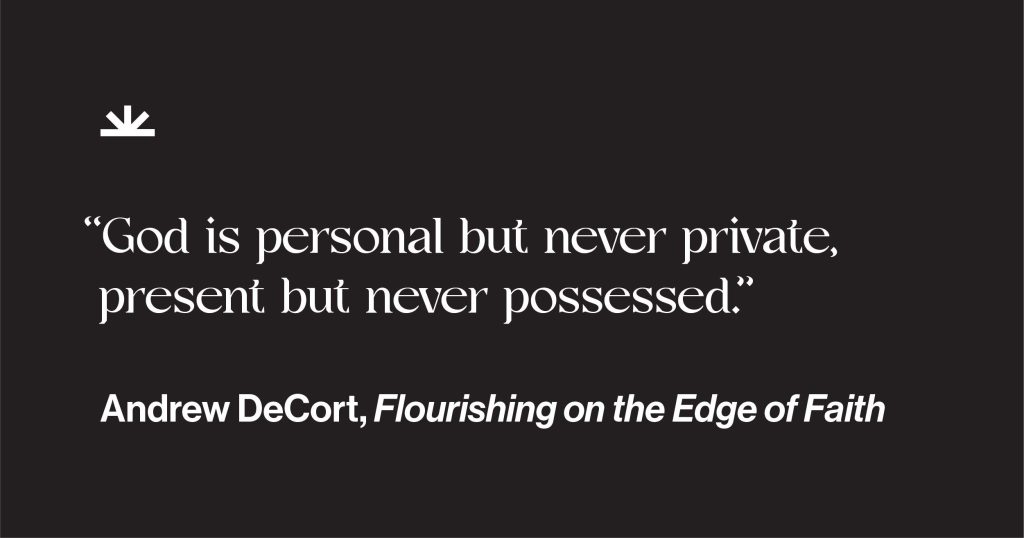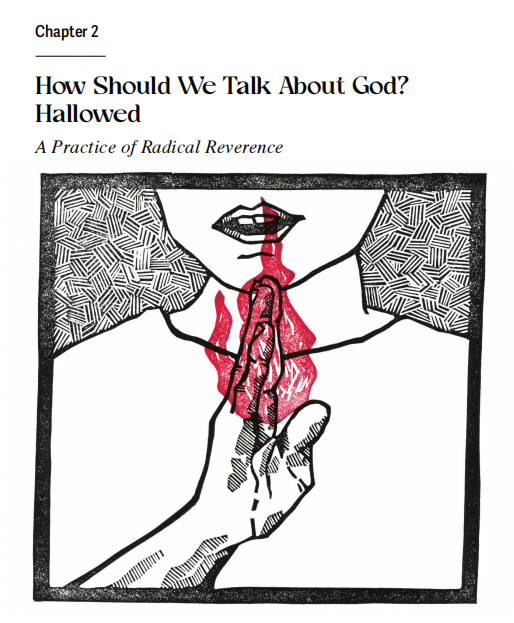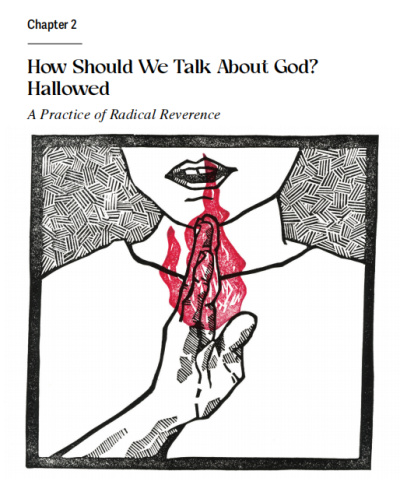Dear friends,
This week I’m delighted to share an excerpt from chapter two of Flourishing on the Edge of Faith.
This section faces head-on what’s at stake in the second line of Jesus’s prayer: the human tendency to weaponize God. In response, Jesus teaches us to pray “Hallowed be your name.” I call this a practice of radical reverence, and here’s the heart of it:

I warmly invite you to practice Jesus’s prayer every day in 2023, and I’d be thrilled if Flourishing could accompany your journey. It’s available at BitterSweetBooks, Audible, Kindle, Barnes & Noble, and all major booksellers.
Two quick updates before the excerpt below:
First, warm thanks to Lynn Dugan and her book club for starting 2023 with Flourishing. Their feedback was so encouraging, and I’m delighted the book’s study guide (Appendix 3) is making it so easy to discuss. If you’re part of a small group, consider reading Flourishing together in 2023. I’d love to visit and join the discussion!

Second, my 60-minute podcast conversation with Zach Elliott is an energizing intro to Flourishing and available on Apple Podcasts, Spotify Podcasts, and other platforms. Look for LAB: The Podcast Episode #125.
I hope you enjoy the excerpt from chapter 2 below!
May you flourish as you practice hallowing God’s name with Jesus,
Andrew
Weaponizing “God”

Flames rise up and touch the lips from a hand signing the word “silence.” Artwork by Holly Harris
Jesus invites us to talk to God as our loving and liberating Parent. Our flourishing begins here in this primal place of our divine belovedness.
But all too easily and often, talk of “God” is badly abused and goes terribly wrong. We’re especially vulnerable to this when we feel insecure and under threat. In the worst cases, “God” gets twisted into a dangerous tool for deception and destruction. Adolf Hitler and his fascist Nazi movement confront us with one of the most sobering case studies of weaponizing “God” in history.
Hitler became the leader of Germany on January 30, 1933. Soon after, he announced over German radio, “We have put an end to the denial of God and the abuse of religion.” In a time of national humiliation and suffering after World War 1, Hitler styled himself as the guardian of “God” and the savior of Germany. He declared that his movement would “restore loyalty, faith, and decency” in Germany. With “God” on their side, Hitler promised that “the poisoning of our public morality” was over and that Germany was destined for greatness again.
Six years later, Hitler plunged the world into a second devastating war. In his national address that year, Hitler piously celebrated his “Greater Germany” as the creation of “the grace of God.” Alluding back to his promise to defend “God,” Hitler boasted that the Nazi state had “not closed a single church.” He praised the events unfolding in Germany – which included mass arrests, racist massacres, and totalitarian terror – as proof of “the Lord Almighty’s blessing.” Hitler even called himself a “prophet” and promised “the annihilation of the Jewish race in Europe.” Alas, invoking God and inciting genocide in the same speech is an old trick in the history of political propaganda.
Sadly, Hitler’s god-talk was extremely effective. This is what people wanted to hear in their time of vulnerability and desperation. In fact, in some regions of Germany, 89 percent of the pastors pledged to be “faithful and obedient” to Hitler in the name of “God.” Many of Germany’s most rigorous Christian scholars and theologians became enthusiastic Nazis. German society was mobilized by this intoxicating cocktail of “God” and nationalism. From the start, Dietrich Bonhoeffer warned that Hitler’s “God” was “nothing but our own ego.”
In retrospect, we know the devastating results of what Hitler attributed to “God” and “God’s blessing.” Totalitarian terror was unleashed. A vicious, scientifically baseless racial ideology was popularized. Six million Jews and other minorities were murdered in unspeakable genocidal horror. And the world was wracked by another catastrophic war.
In the dark shadow of Hitler’s death camps – as well as the child abuse in churches today, the corruption of celebrity leaders, and countless other religious scandals – we know all too well that talk of “God” can be dangerous and destructive. Reflecting on our history, the poet Amanda Gorman astutely observes, “Our future needs us / alarmed.”
Jesus presciently understood this need for alarm. He had a sober view of human fallibility and our tendency to invoke “God” for our own corrupt ambitions.
So after inviting us to intimately address God as our Father, Jesus brilliantly interrupts any false familiarity with God. He calls us to wrestle with the disruptive question, “How should we talk about God?”
Jesus’s response is fierce and freeing. He teaches us to pray Hallowed be your name (Matthew 6:9 and Luke 11:2). With these four radioactive words, Jesus sounds an alarm in our ears, sets a refining fire in our mouths, and tests whether our talk about “God” is real or just a ruse for our selves before we say another word. Those who call God our Father must also name God’s otherness, God’s transcendence, God’s ineffable difference from every human project and power. We must hallow God’s name – a practice that Hitler strategically expunged from Jesus’s prayer leading up to the Holocaust…
*** Excerpted from Andrew DeCort, Flourishing on the Edge of Faith: Seven Practices for a New We (Washington, DC: BitterSweetBooks, 2022), 24-26. Available at BitterSweetBooks, Audible, Kindle, Barnes & Noble, and all major booksellers.




